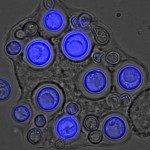Link to Pubmed [PMID] – 7793868
Antimicrob. Agents Chemother. 1995 Mar;39(3):656-60
Fluconazole (FCZ) has been extensively used as a primary therapy for oropharyngeal candidosis in AIDS patients. Clinical resistance to FCZ is now encountered, often related to decreased susceptibility of the isolate in vitro. We wondered if low levels in saliva play a role in the therapeutic failure, especially in patients complaining of dry mouth. Sixteen AIDS patients treated for oropharyngeal candidosis with FCZ were studied. MICs for the isolates were determined. Serum and saliva samples were collected to measure FCZ levels with a bioassay using paper disks loaded with the clinical specimens. We showed that (i) paper disks were convenient for collecting saliva in patients with dry mouth; (ii) levels in saliva depended on the FCZ dosage regimen but did not correlate with the response to therapy; (iii) correlation between concentrations in saliva and serum was poor and independent of clinical response to treatment, other therapies, or decreased salivation; and (iv) levels in saliva were always lower than MICs in patients who failed to respond to treatment. In conclusion, therapeutic failures are more likely to be related to in vitro resistance of the isolate to FCZ or insufficient dosage regimen than to decreased salivary secretion.


